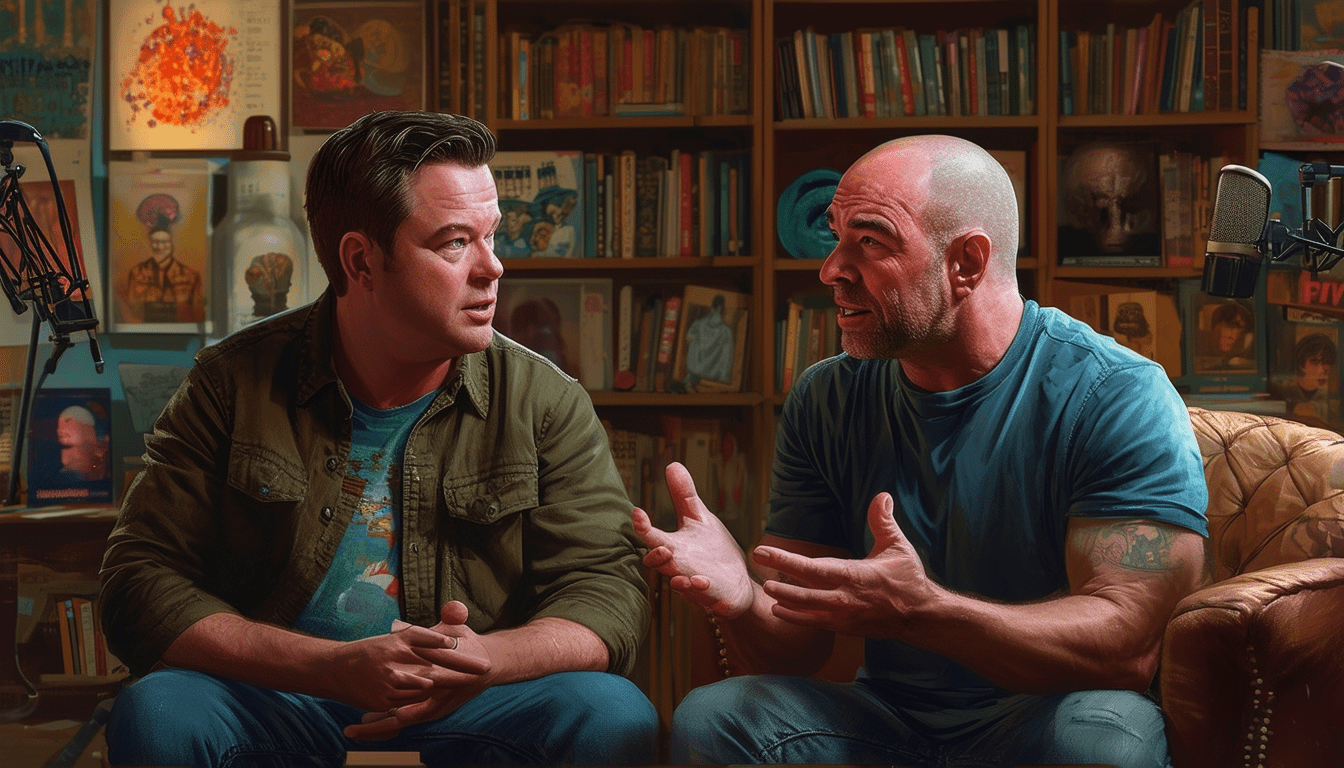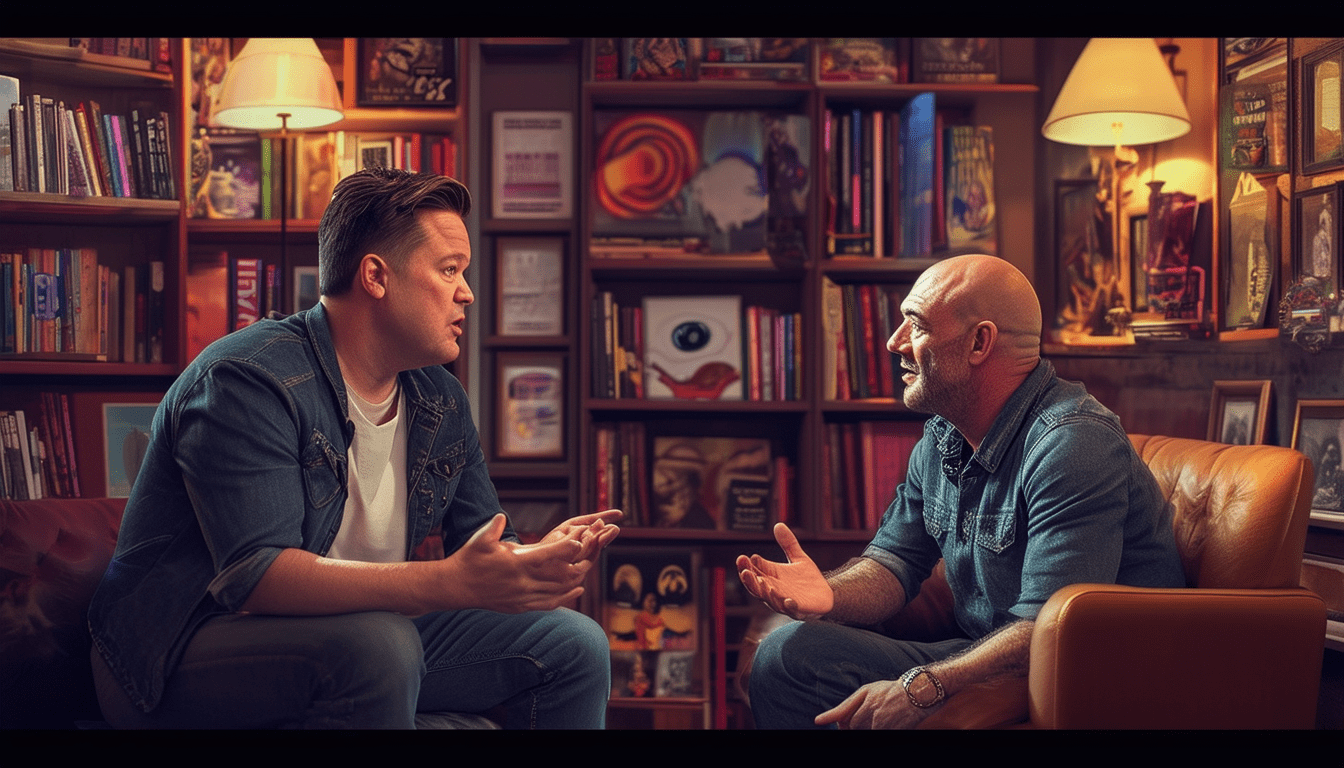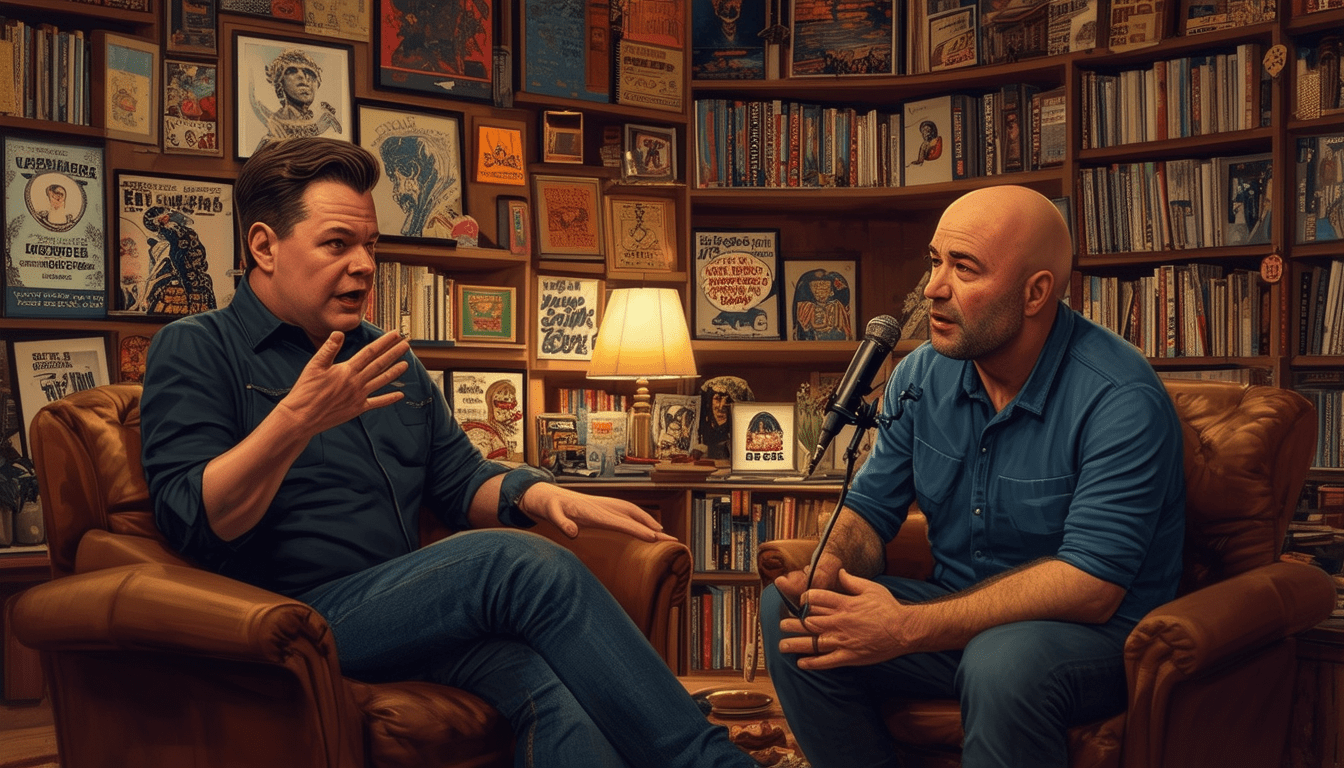JD Vance Seeks Joe Rogan’s Insights on Expanding Psychedelic Access for Veterans Following a Captivating Exploration of Drug War History
|
IN BRIEF
|
The discussion surrounding the potential benefits of psychedelics for veterans has gained significant traction, particularly in the context of mental health treatment. Recently, Senator JD Vance, intrigued by the therapeutic possibilities of substances such as MDMA and psilocybin, reached out to podcaster Joe Rogan for guidance on how to navigate the complexities of expanding access to these compounds for veterans in need. This dialogue, sparked by a compelling review of the historical nuances of the drug war, emphasizes the urgent need for legislative and societal shifts towards understanding and utilizing psychedelics as a viable option for supporting those who have served.

In a recent discussion on the popular podcast hosted by Joe Rogan, Senator JD Vance expressed his intrigue regarding the potential benefits of psychedelic therapy for veterans suffering from serious mental health conditions. This conversation followed a revealing examination of the history surrounding the drug war, shedding light on how past policies have shaped current perceptions and access to these therapeutic substances.
Exploring the Therapeutic Potential of Psychedelics
During the podcast, Vance articulated his growing fascination with the therapeutic applications of psychedelics such as MDMA and psilocybin, particularly for those who have served in the military. Recognizing the dire mental health challenges faced by veterans, he solicited Rogan’s advice on establishing a viable pathway for the legal administration of these substances. This dialogue marks a significant moment in Vance’s journey, illuminating his commitment to exploring innovative solutions for veteran care.
Reflecting on Drug War History
The conversation took a crucial turn as Rogan educated Vance on the contentious history of marijuana prohibition and how it correlates to current attitudes toward psychedelics. Vance admitted to being unaware of many key aspects of this history, illustrating a gap in understanding that is common among policymakers. This newfound knowledge enabled him to re-evaluate his stance on drug policies and acknowledge the need for reform-driven discussions surrounding psychedelics.
The Need for Change in Policy
Vance articulated his belief that individuals should not face criminalization for their use of substances like cannabis, extending this philosophy to psychedelics. He emphasized the necessity of creating a legal framework that facilitates access to these therapeutic options for veterans, arguing that every effort should be made to address their mental health needs. This perspective aligns with a growing consensus among mental health professionals and advocates, who recognize the importance of reevaluating our approach to substance use in therapeutic contexts.
Challenges in the Research Landscape
During their talk, the Senator raised pertinent questions regarding the implications of the Food and Drug Administration (FDA) in providing access to psychedelics for medical use. He expressed confusion about why innovative treatments have yet to gain traction, pondering if corporate interests have contributed to the stagnation of progress in this area. With the FDA’s recent rejection of new drug applications for MDMA-assisted therapy, Vance’s concerns signal an urgent need for policy reform to better support veterans in their search for effective treatments.
A Cynical View of Current Drug Policy
The discussion turned flagrant when Rogan suggested that vested interests in the pharmaceutical sector might impede progress in implementing psychedelic therapies. This critical view reflects widespread skepticism about the motives behind current drug policies. Vance, sharing this sentiment, pointedly questioned whether the reticence toward psychedelic medicine could be rooted in corporate lobbying and profit-driven motives instead of genuine concern for public welfare.
Balancing Regulation with Access
Throughout the conversation, Vance emphasized the importance of finding a balance in regulating drug use and ensuring accessible pathways for treatment. He reflected on the complexities surrounding the discourse on marijuana and psychedelics, acknowledging the need to engage in dialogue that respects both public health concerns and individual freedoms. Vance articulated a vision for creating a regulatory environment that safeguards public interests without infringing on personal liberties regarding substance use.
Implications for Veterans’ Health Policy
The engaging exchange between Vance and Rogan serves as a clarion call for dissecting the tangles of current drug policy, particularly as it pertains to veterans. By advocating for psychedelic therapy, Vance aligns himself with a progressive outlook on mental health, one that recognizes the need for alternative treatments in the face of an escalating mental health crisis among veterans. This enlightening conversation could potentially catalyze change, encouraging policymakers and health professionals to explore effective solutions grounded in scientific research and clinical practice.
Comparison of JD Vance’s Perspectives on Psychedelic Therapy for Veterans
| Aspect | Details |
| Therapeutic Interest | Vance is fascinated by the potential of psychedelics to aid veterans’ mental health. |
| Cannabis Stance | Supports decriminalization and allows states to set their own cannabis policies. |
| Research Awareness | Vance acknowledged the historical ignorance regarding psychedelics’ medical benefits. |
| Veteran’s Access | Inquires about pathways for veterans to access psychedelics for treatment. |
| FDA Concerns | Questions the lack of progress on FDA approval for psychedelics in therapy. |
| Psychedelic Testing Challenges | Recognizes the difficulties in conducting double-blind studies with psychedelics. |
| Pharmaceutical Industry Impact | Speculates on the influence of pharma lobbying in hindering psychedelic research. |
| Marijuana Policy Shift | Expresses a shift from strict enforcement to a more lenient stance on marijuana use. |
| Public Perception | Desires a legal regime that limits drug use in public spaces while not criminalizing users. |

In a recent appearance on Joe Rogan’s podcast, Senator JD Vance expressed an intriguing interest in the therapeutic use of psychedelics, particularly focusing on substances like MDMA and psilocybin. His dialogue opened up discussions on the potential pathways for granting veterans suffering from severe mental health conditions improved access to these substances. This conversation comes on the heels of Rogan providing Vance with critical insights into the drug war history, highlighting the need for policy changes related to psychedelics.
The Intersection of Politics and Psychedelic Therapy
Vance’s recent discourse marks a significant point in the intersection of politics and psychedelic therapy. Describing a philosophy of “live and let live,” the senator commented on how individuals should not be criminalized for their choices regarding substances, including cannabis and psychedelics. His openness to exploring psychedelics for veterans underscores a growing recognition of their potential benefits in mental health treatment.
Rogan’s Informative Insights on Drug Policy
During the podcast, Joe Rogan took the opportunity to elaborate on the medical value of psychedelics, drawing attention to the restrictive federal drug scheduling laws that hinder access to necessary treatments. Vance admitted to being unaware of many historical discrepancies surrounding marijuana prohibition and related these issues back to the modern-day challenges faced by veterans seeking therapeutic alternatives.
A Call for Change in Medical Access
Questioning the current regulatory framework, Vance probed how veterans can navigate the complexities of acquiring psychedelics under existing laws. His inquiries positioned the discussion toward a future where the Food and Drug Administration (FDA) might play a crucial role in sanctioning psychedelic-assisted therapies. Such regulatory endorsement could greatly alleviate the mental health struggles faced by many veterans.
Addressing Mental Health Needs of Veterans
Vance’s time in the Marine Corps instilled in him a personal connection to the pressing mental health issues veterans encounter. His acknowledgment of the significant anecdotal evidence suggesting that veterans may find relief through psychedelics indicates a shift in understanding the complexities of mental health treatment options available to this demographic.
The Road Ahead: Overcoming Barriers
Vance’s remarks raise essential questions about the challenges of conducting clinical studies on psychedelics, particularly around the need for double-blind tests. Despite the complications, the senator remains adamant that clinical research must progress to ascertain the genuine efficacy of psychedelics in treatment protocols. Federal agencies have begun funding such research, yet navigating past bureaucratic hurdles remains a significant challenge.
Future Implications for Drug Policy Reform
As the conversation between Vance and Rogan unfolds, it paints a picture of a vital transformation in drug policy reform. With growing political interest and promising research into psychedelic therapy, the potential for expanded access could redefine how the nation supports veterans’ mental health needs. The dialogue serves as a compelling call to action for lawmakers to consider more progressive policies regarding psychedelics.
- Sen. JD Vance intrigued by psychedelics therapeutic potential for veterans.
- Seeks Joe Rogan’s advice on creating access pathways.
- MDMA and psilocybin identified as potential treatments.
- Philosophy: “live and let live” regarding drug use.
- Emphasizes decriminalization of cannabis.
- Recognizes the complexity of clinical studies involving psychedelics.
- Questions FDA involvement in psychedelic drug approvals.
- Advocates for helping veterans with mental health needs.
- Links ignorance and pharma interests to resistance against psychedelics.
- Cautious about children’s access to psychedelics.
In a recent conversation between Senator JD Vance and podcast host Joe Rogan, the topic of expanding access to psychedelics for military veterans was brought to light. Vance, who expressed his fascination with the therapeutic potential of psychedelics, particularly MDMA and psilocybin, sought Rogan’s insights on how to create a pathway for veterans plagued by mental health issues to access these substances. This engagement not only probes the intricacies of drug policy but also calls for the reevaluation of existing regulations on psychedelics, especially in the context of veteran affairs.
The Need for Change in Drug Policy
In recent years, a growing body of evidence has emerged suggesting that psychedelics can significantly alleviate symptoms of PTSD and other serious mental health conditions among veterans. Vance highlighted the necessity of changing perceptions and laws surrounding these substances. By facilitating access to psychedelics under medical supervision, we can address the mental health crisis facing many of our service members, who often resort to conventional medications that may not be effective.
Therapeutic Benefits of Psychedelics
Psychedelics like MDMA and psilocybin have shown promise in clinical settings. Numerous anecdotal reports illustrate veterans experiencing profound relief from their symptoms after engaging in psychedelic-assisted therapies. Vance acknowledged this potential during his discussion with Rogan, indicating that more research is necessary to understand the full scope of benefits provided by these substances. This perspective advocates for research funding and clinical studies to promote legitimate use cases for psychedelics in treating mental health.
Addressing Regulatory Challenges
One of the significant barriers to psychedelic therapy remains the current federal scheduling laws. Vance expressed his curiosity about how to navigate these regulations, particularly concerning the FDA and its role in drug approvals. While he was not ready to commit to a definitive policy shift, it is essential to initiate discussions about reclassifying psychedelics for medical use. Such changes could potentially lead to newfound avenues for therapy and healing.
Importance of Public Awareness and Education
Given the misconceptions surrounding psychedelics, public education plays a crucial role in shaping future policy. Engaging with veterans, healthcare professionals, and the general public about the positive impacts of psychedelics could dismantle longstanding stigmas. Vance’s willingness to explore these topics in a platform as influential as Rogan’s podcast is a step towards promoting awareness and fostering informed discussions. Media coverage can further amplify narratives that highlight the human experiences and benefits associated with psychedelic therapy.
Engaging Stakeholders in Policy Reform
Psychedelic policy reform requires a collaborative effort involving veterans’ organizations, mental health advocates, and lawmakers. By fostering dialogue among these stakeholders, we can bridge gaps in knowledge and develop comprehensive policies that prioritize veterans’ mental health. This should include veteran-led initiatives to ensure that the voices of those directly affected by PTSD and other mental health issues are central to the conversation.
Role of Pharmaceutical Companies
The relationship between pharmaceutical companies and the psychedelic movement merits careful consideration. As Vance speculated, existing pharmaceutical interests might resist a transition towards treatments that challenge traditional psychotropic medications. Understanding these dynamics will be essential for navigating potential lobbying hurdles while advocating for veterans’ access to alternative therapies.
Frequently Asked Questions
What did Senator JD Vance discuss with Joe Rogan regarding psychedelics? Senator JD Vance expressed his fascination with the therapeutic potential of psychedelics and sought advice on creating a pathway for military veterans to access substances like MDMA and psilocybin for mental health treatment.
What is Vance’s philosophy on marijuana and psychedelics? Vance stated that his overall philosophy is “live and let live,” emphasizing that individuals should not be criminalized for using cannabis.
Did Vance commit to any public policy regarding psychedelics during the podcast? No, Vance made it clear that he was not committing to any public policy but was keen to learn more about the subject.
What previous experiences does Vance have as a veteran? Vance served four years in the Marine Corps, including deployments to Iraq and Haiti, which informed his interest in veterans’ access to psychedelics.
What concerns did Rogan raise regarding psychedelic access for veterans? Rogan pointed out that there are many anecdotal stories of veterans finding relief through psychedelics, suggesting that access should be made available to them.
What did Vance inquire about the FDA’s role in psychedelic access? Vance questioned whether access to psychedelics would require approval from the FDA, especially in cases where these substances could have medical uses.
What was Vance’s reaction to the challenges of studying psychedelics clinically? Vance acknowledged the difficulty of conducting double-blind placebo tests with psychedelics but still emphasized the importance of studying their effectiveness in helping people.
What stance does Vance hold concerning marijuana legalization? Vance has expressed support for states’ rights concerning cannabis policy and opposes criminalizing individuals for marijuana possession.
How does Vance view the intersection of psychedelics and pharmaceutical interests? Vance voiced concerns that pharmaceutical lobbying might inhibit progress in solving mental health issues through alternative treatments such as psychedelics.
What unique perspective did Vance share during his discussion with Rogan? Vance’s tone during the podcast differed from his campaign trail discussions, showing a more open-minded approach to the potential benefits of psychedelics.
What historical context did Rogan provide to Vance during the interview? Rogan educated Vance about the historical issues surrounding marijuana prohibition, which Vance admitted he was unaware of.





Post Comment